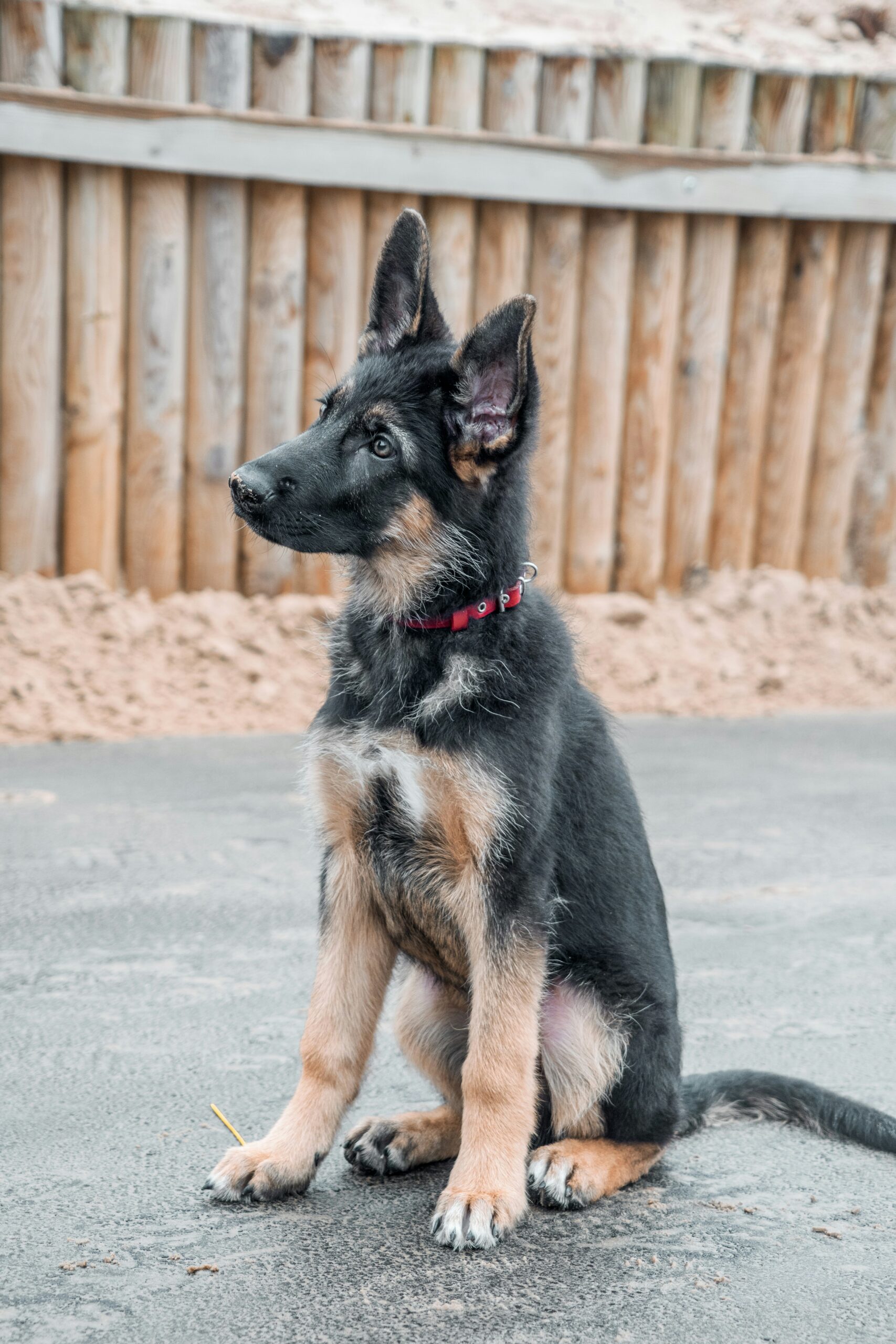
Introduction to German Shepherds
The German Shepherd is a breed that has garnered widespread admiration for its exceptional qualities, primarily bravery and intelligence. This noble breed originated in Germany in the late 19th century, created through the efforts of Max von Stephanitz, who aimed to produce a working dog that excelled in herding and protection. The early German Shepherds were developed from a mix of various shepherding dogs, each chosen for traits such as stamina, loyalty, and trainability. As a result, this breed emerged with a strong work ethic, an eagerness to learn, and a protective nature that makes it an outstanding choice for families and professionals alike.
Over time, German Shepherds have evolved to serve various roles beyond their initial purpose of herding. They are widely recognized as service dogs, search and rescue dogs, and police and military canines. Their remarkable physical capabilities, coupled with their keen intelligence, enable them to perform complex tasks and follow commands effectively. This versatility has made them essential in many fields, proving their adaptability and skill in various environments.
Furthermore, the German Shepherd’s strong protective instincts make it an ideal guardian. Their loyalty to families and their watchdog tendencies ensure they remain vigilant and alert to any potential threats. The breed’s natural courage and sense of duty have contributed to its reputation as a courageous protector, leading to widespread acceptance in both civilian and law enforcement roles. Overall, the German Shepherd’s unique blend of intelligence, bravery, and protectiveness underscores its status as one of the most revered dog breeds in the world, and it continues to be a preferred choice for those seeking a reliable and protective companion.
The History of the German Shepherd
The German Shepherd breed originated in the late 19th century in Germany, where the desire for a versatile working dog led to the careful selection and breeding of various herding dogs. The breed’s inception is largely credited to Captain Max von Stephanitz, who sought to create a dog capable of herding and guarding sheep and livestock. In 1899, he acquired a dog named Hektor Linksrhein, who would later be renamed Horand von Grafrath. This dog was recognized as the first official German Shepherd, establishing the foundation for the breed.
Captain von Stephanitz’s vision involved not only developing a herding dog but also a companion that could excel in various roles, including police work, search and rescue, and military operations. As a result, the early German Shepherds were bred for intelligence, strength, and endurance, inheriting traits from local herding breeds such as the Swabian Wolf Dog and the Thuringian Sheepdog. These breeding practices solidified the German Shepherd’s status as a reliable working dog.
During World War I and World War II, the German Shepherd played significant roles for the German army, serving as messenger dogs, sentries, and search and rescue dogs. These experiences showcased the breed’s loyalty, courage, and adaptability, reinforcing their reputation as exceptional protectors. Notably, the breed gained popularity in other countries during and after the wars, notably in the United States, where they were admired for their capability in various tasks, including police and military roles.
Over the years, the German Shepherd has evolved, with a focus on refining their characteristics to enhance their roles as protectors and companions. Through selective breeding, the breed continues to exhibit remarkable qualities such as intelligence, loyalty, and trainability, making them cherished partners for families and working professionals alike.
Physical Characteristics and Temperament
The German Shepherd is a renowned breed, celebrated not only for its striking appearance but also for its exceptional qualities that make it a favored companion and protector. This breed typically exhibits a well-proportioned and muscular body, with males weighing between 65 to 90 pounds and females ranging from 50 to 70 pounds. Standing at approximately 24 to 26 inches tall at the shoulder, German Shepherds possess a commanding presence that embodies both strength and elegance.
One of the breed’s most distinctive features is its double coat, which can come in various colors, including black and tan, sable, and solid black. The outer layer is dense and weather-resistant, while the undercoat is soft and serves to provide insulation. This coat not only aids in protection but also contributes to the breed’s overall regal bearing. Furthermore, their erect ears and expressive eyes enhance their alert and intelligent demeanor.
Temperamentally, German Shepherds are often described as loyal, courageous, and intelligent. These dogs are known for their keen sense of smell and ability to learn commands quickly, making them ideal working dogs in various fields, including police work and search and rescue missions. Their loyalty to their family is unwavering, and they tend to form strong bonds with their human companions, making them excellent family pets as well.
Their courageous nature drives them to protect their home and loved ones fiercely. However, it is essential to socialize and train them properly, as their protective instincts can sometimes make them wary of strangers. Overall, the combination of their impressive physical characteristics and their admirable temperament makes German Shepherds one of the most versatile and beloved breeds in canine history.
Training Your German Shepherd for Protection
German Shepherds are renowned for their intelligence and protective instincts, making them ideal candidates for personal and home protection training. To effectively train a German Shepherd for protection, it is crucial to start with obedience training, as this sets a solid foundation for all future training endeavors. Obedience training instills discipline and establishes a respectful relationship between the dog and the handler. Moreover, it allows the dog to respond consistently to commands, which can be pivotal in high-pressure situations.
Socialization is another critical aspect when training a German Shepherd for protection duties. Early exposure to a variety of environments, people, and other animals helps in developing a well-rounded temperament. A socialized German Shepherd is less likely to exhibit fear or aggression towards unfamiliar stimuli, which can be beneficial in various real-life scenarios. Introduce your dog to different settings and allow them to interact with controlled groups of people and animals to enhance their confidence and adaptability.
Once basic obedience and socialization training are established, you can introduce specific protection training techniques. Many handlers employ positive reinforcement methods, which encourage dogs to associate protective behaviors with rewards. Training sessions should be conducted in a controlled environment to facilitate learning. As the dog progresses, gradually expose them to simulated scenarios that mimic real-world protection situations, such as unscripted interactions with strangers or controlled exercises that mimic potential threats.
Additionally, consider seeking the assistance of professional trainers who specialize in protection training. Their expertise can provide valuable insights and help ensure that training is both effective and safe. A well-trained German Shepherd can become a loyal protector of your home, capable of responding aptly to threats while remaining an affectionate companion. The blend of obedience, socialization, and targeted protection techniques will harness the remarkable capabilities of this breed in a constructive and reliable manner.
The Role of German Shepherds in Security and Law Enforcement
German Shepherds have established themselves as indispensable partners in various sectors, particularly in security and law enforcement. Renowned for their intelligence, loyalty, and protective instincts, these dogs are frequently employed by police forces and military units worldwide. Their ability to follow complex commands and make quick decisions separates them from other breeds, making them a preferred choice for various tasks such as tracking, searching, and apprehending suspects.
The comprehensive training regimen for German Shepherds encompasses obedience, agility, and specialized skills tailored to specific duties. In law enforcement, these canines often undergo training in scent detection, enabling them to locate drugs, explosives, or missing persons. Their olfactory capabilities are remarkable, providing them with an edge in high-stakes situations where human capabilities may fall short. In military applications, these dogs are trained for tactical operations, where they assist in detecting threats and offering protection to their handlers.
The bond formed between German Shepherds and their handlers is crucial to their effectiveness in security roles. This connection is built through consistent training and mutual trust, enabling the dogs to perform complex tasks under pressure. Handlers often rely on their canine partners not only to follow commands but also to make quick decisions based on situational cues. This teamwork fosters a dynamic partnership that can be vital for both safety and operational success.
In the realm of search and rescue operations, German Shepherds play a pivotal role as well. Their keen sense of smell aids them in locating individuals who may be lost or trapped in disaster scenarios. Their strength and stamina enable them to traverse difficult terrains, making them valuable assets in crisis situations.
The multifaceted roles of German Shepherds in security and law enforcement exemplify their abilities as not just pets, but as crucial members of teams dedicated to safeguarding lives and maintaining order.
Health and Maintenance of German Shepherds
German Shepherds, known for their intelligence and loyalty, are prone to certain health issues that can affect their overall well-being. Among these, hip dysplasia and degenerative myelopathy are two significant conditions that owners should be aware of. Hip dysplasia is a genetic disorder where the hip joint does not fit properly into the hip socket, leading to arthritis and pain. On the other hand, degenerative myelopathy affects the spinal cord, resulting in progressive weakness and loss of mobility. Understanding these conditions enables owners to take proactive steps in maintaining their pet’s health.
To help mitigate the risks of these health issues, a balanced diet is essential for German Shepherds. It is advisable to consult a veterinarian to determine the appropriate nutritional requirements based on the dog’s age, size, and activity level. High-quality dog food that contains the right balance of proteins, fats, and carbohydrates supports their overall health and helps maintain a healthy weight, reducing stress on the joints.
Regular exercise plays a critical role in maintaining the vitality of German Shepherds. Daily walks, playtime, and mental stimulation, such as obedience training or puzzle toys, are beneficial for both physical and mental health. Mental stimulation is particularly important for this intelligent breed, as keeping their minds engaged can prevent behavioral issues.
Grooming is another important aspect of health maintenance. German Shepherds have double coats that shed throughout the year, especially during seasonal changes. Regular brushing helps reduce shedding and mats while promoting skin health. Furthermore, routine veterinary check-ups are crucial for early detection of potential health concerns. Vaccinations, dental check-ups, and screenings for genetic conditions are vital components in ensuring that your German Shepherd remains a happy and healthy companion for years to come.
German Shepherds as Family Companions
German Shepherds are well-known for their unmatched loyalty and protective nature, which makes them exceptional family companions. These dogs are not only vigilant guardians but also affectionate members of the household, deeply bonding with their human family. Their innate intelligence enables them to understand the nuances of family dynamics, allowing them to respond appropriately to different situations, whether it be comforting a child or defending the home against perceived threats.
This breed is particularly fond of engaging in family activities, often seen participating in games like fetch or simply lounging around with their loved ones. The strong connection they form with family members leads to an increased sense of security for all involved. German Shepherds often take it upon themselves to watch over children, demonstrating a combination of gentleness and strength that reassures parents while providing companionship to the little ones.
Moreover, their social nature ensures that they thrive in a family environment, where interaction and companionship are abundant. They require regular physical exercise and mental stimulation, making them ideal partners for active families. This need for engagement can help instill values of responsibility and teamwork within children, as they learn to care for and interact with their canine companion.
Furthermore, German Shepherds are known to be highly trainable, which enhances their ability to integrate smoothly into family life. They respond well to training and are capable of learning a variety of commands and tricks, adding to the enjoyment of having them as pets. This adaptability not only fortifies their role within the family but also ensures that they contribute positively to the overall family environment.
Different Lines of German Shepherds
German Shepherds, renowned for their intelligence and bravery, are classified into several lines, each tailored for distinct purposes. The three primary categories include working lines, show lines, and companionship lines, which exhibit unique characteristics, abilities, and suitability for various roles.
Working lines are specifically bred for their drive, stamina, and intelligence. These German Shepherds often excel in police and military work, search and rescue operations, and protection duties. Their heightened work ethic makes them suitable for intensive training, allowing them to perform complex tasks effectively. Unlike their show counterparts, working line German Shepherds may have a more utilitarian appearance, emphasizing physical capability over aesthetic beauty.
Show lines, in contrast, are bred primarily for conformity to breed standards and for participation in dog shows. These dogs typically emphasize physical traits such as coat quality and appearance, which can sometimes lead to compromises in working ability. While show line German Shepherds are often gentle and well-tempered, they may lack the intense drive seen in working line individuals, making them more suited for companionship and exhibitions than for rigorous tasks. Nevertheless, many show line dogs retain protective instincts, making them loyal family pets.
Finally, companionship lines focus on temperament and behavior traits ideal for family settings. These German Shepherds are often bred to be friendly, sociable, and adaptable. They tend to be excellent companions for families and individuals, prioritizing a stable temperament over working capabilities. Although they may not be as driven as their working line counterparts, companionship lines still possess protective instincts, making them suitable for home protection while enjoying a loving environment.
Understanding these different lines of German Shepherds is essential when selecting the right dog for specific training purposes, protection needs, or family companionship. Each line offers unique advantages and should be evaluated based on the individual’s lifestyle and objectives.
Choosing the Right German Shepherd for You
When considering adding a German Shepherd to your household, it’s essential to evaluate various factors to ensure compatibility with your lifestyle and needs. One of the first aspects to consider is the age of the dog. Puppies require significant time and dedication for training, socialization, and bonding. On the other hand, adult German Shepherds often come with existing training, but they may also have established behavioral patterns that might require adjustment.
Another critical factor is temperament. German Shepherds are known for their intelligence and loyalty, yet their personalities can vary widely. It is advisable to spend time with potential dogs to assess their behavior. A well-socialized German Shepherd usually exhibits confidence and calmness, while those that are overly shy or aggressive may need extensive training and rehabilitation.
Additionally, understanding the dog’s training history is pivotal. A dog that has been well-trained not only demonstrates better behavior but also integrates more smoothly into your home environment. Look for dogs that have undergone basic obedience training, and inquire if they have experience in specific tasks, such as protection work, therapy, or service roles. This can inform their suitability for various responsibilities, from family protection to companionship.
Moreover, considering the future role of the German Shepherd in your life is essential. For those looking for an active canine companion, young German Shepherds may be ideal due to their high energy levels and eagerness to engage in physical activities. Conversely, if you seek a loyal protector, focusing on individual traits and past experiences will lead you to a dog more attuned to security tasks.
In conclusion, selecting the right German Shepherd involves careful consideration of age, temperament, and training history. By evaluating these aspects, potential owners can make informed decisions, helping to ensure a harmonious and rewarding relationship with their canine companion.
Conclusion: Why German Shepherds are Exceptional Protectors
In evaluating the remarkable qualities of German Shepherds, it becomes evident that these dogs are not just pets but also exceptional guardians of homes and families. Their intelligence ranks among the highest in canine breeds, allowing them to learn commands and tasks with astounding efficiency. This mental agility enables them to perform a multitude of roles, ranging from companionship to complex protection duties.
Moreover, the loyalty exhibited by German Shepherds is unparalleled. They forge deep bonds with their human families, often exhibiting protective behaviors that stem from their instinctive desire to safeguard their loved ones. This unwavering loyalty not only fosters a sense of security but also establishes a strong emotional connection, making them cherished members of the household.
German Shepherds also possess a natural inclination towards protection. Their physical attributes, such as strength and agility, combined with their keen senses, render them particularly effective at monitoring their environment. Whether it’s deterring intruders or providing critical assistance in various situations, German Shepherds showcase an impressive capability to respond to threats, making them suitable for various roles, including police and military work.
Considering these attributes, it is clear that German Shepherds stand out as dedicated companions and protectors. Their intelligence, loyalty, and inherent protective instincts create a trifecta of qualities that make them exceptional for families seeking a guardian. If one is looking for a breed that combines loyalty with an innate ability to protect, it is worth giving serious thought to the German Shepherd. Their impressive traits come together to make them not just remarkable pets, but formidable protectors of the home as well.





